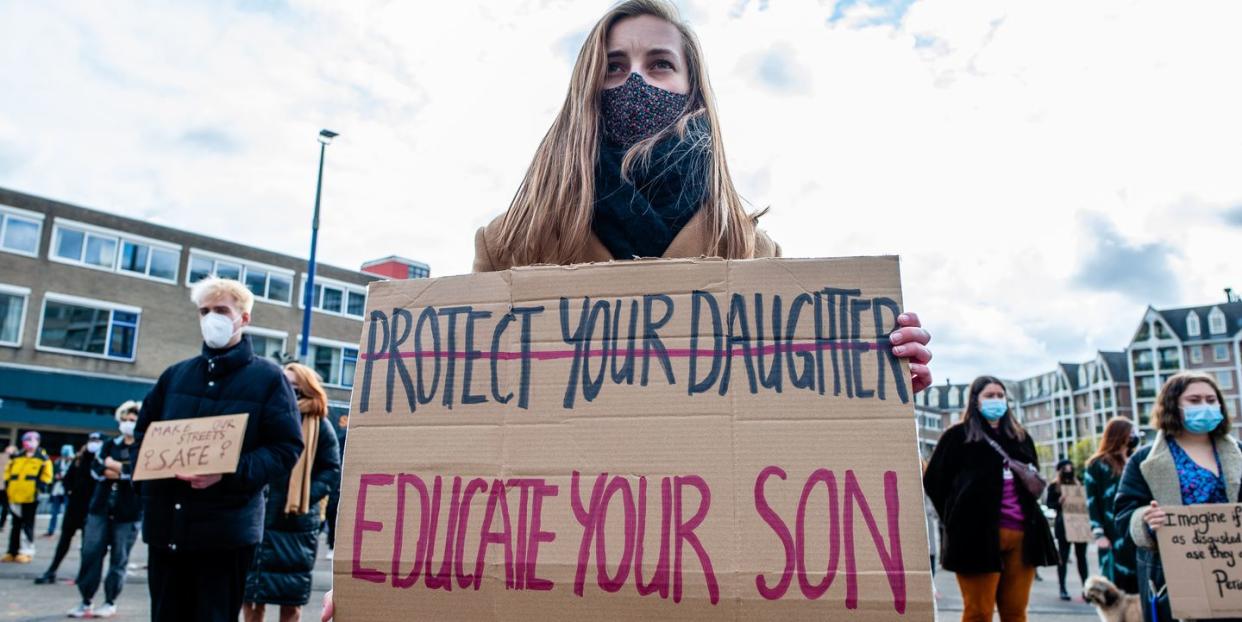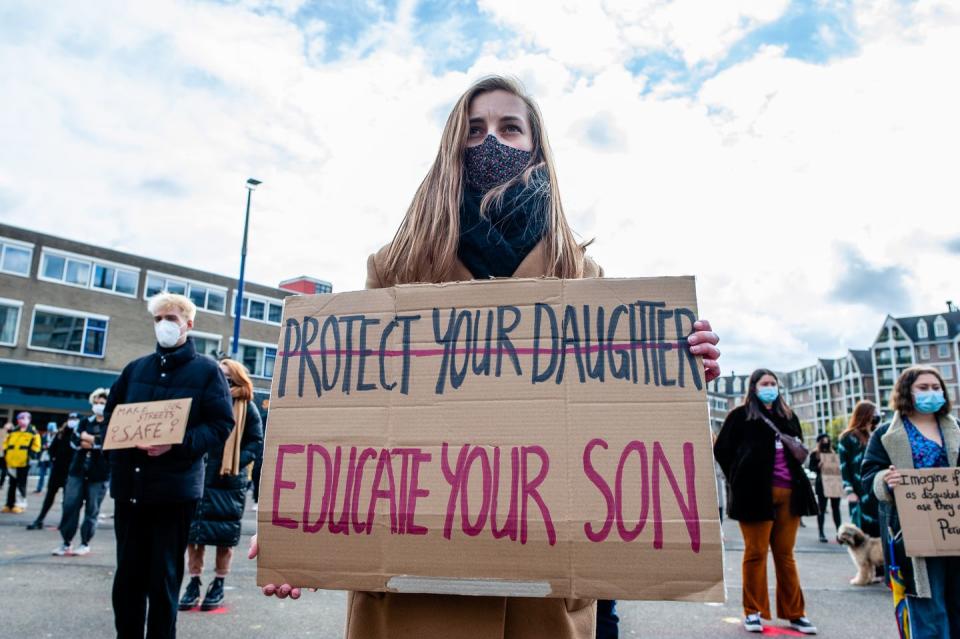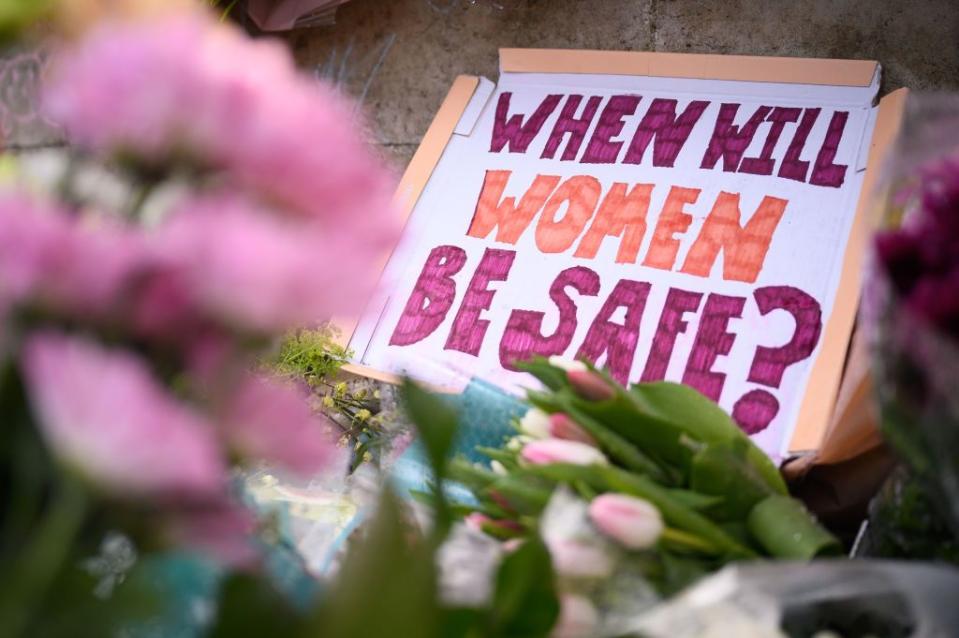Violence Against Women Is a Men's Issue


Years before he kidnapped, raped and murdered Sarah Everard, Wayne Couzens was nicknamed ‘the rapist’ by his colleagues. They could see the type of man he was. They knew he had a taste for violent porn and they knew their female workmates felt uncomfortable around him. But instead of challenging his behaviour, calling him out, reporting him or doing anything that could have potentially altered Sarah’s and his fate, they accepted his behaviour and potentially emboldened him to commit a terrible and tragic act of violence.
Most men if put in the same situation would like to think that they would have challenged Couzens while he was still a creep and before he became a rapist and killer. We're sure his former colleagues think about that all the time, but if we examine our own friendships, how often do we really challenge each other on this stuff? Ask yourself: how many times have you let a sexist remark slide because it was uncomfortable to call it out? We all have, right? In locker rooms, in the office, down the pub. We take our mates' sexist and misogynistic comments as jokes and banter not as a window into their souls. But whatever place it's coming from, we need to do better.
Not that letting friends get away with offensive comments is our only failing. If we’re being honest with ourselves, how many of us have used the words “bitch”, “slag”, “slut”, “pussy”, “THOT”, and not just to reference women, but to talk about our male friends too? We use these words, but we all know the etymology of them and we know who else uses them. In a study by Women’s Aid and the University of Bristol, which examined how domestic abuse survivors described their ordeals, offensive sexualised terms for women – “dirty bitch”, “slag”, “slut” and “nympho” – were “employed as a weapon by perpetrators” to denigrate survivors and justify abusive behaviours.
“All domestic abuse and more widely violence against women is underpinned by a culture of misogyny,” says Teresa Parker, head of media relations and communications at Women’s Aid. “Even if you're not abusive yourself, if you’re agreeing with or not speaking up against sexist attitudes and misogynistic practices with friends or where you work, then you're creating a society and an environment that validates abusive behaviour.”
There are people and organisations trying to intervene and challenge men when their behaviour and words are less than. What they've realised, and what they hope all men come to realise, is that we’re the problem here, so we need to be the solution too.
On Campus
If you want to examine the link between sexism, misogyny and serious acts of sexual violence, then university campuses are the perfect petri dish. It’s estimated that in most developed countries at least 20% of female university students will be subjected to a sexually aggressive act at some point during their studies. And while it’s difficult to compare directly, that number appears notably higher than sexual aggression within the rest of UK society, where, according to the Office for National Statistics, 3.4% of women were victims of sexual assault in 2018, for example.
Universities around the world are known as “breeding grounds for sexual aggression”, but while a large body of research exists on victims, less is known about the perpetrators of these attacks. Finding out more was the impetus behind a recent study carried out by researchers at the University of Kent’s Centre of Research and Education in Forensic Psychology.
For the study, Understanding Sexual Aggression in UK Male University Students, researchers asked 554 male students at UK universities to complete an anonymous survey on their sexual habits and attitudes towards women. They found that 63 of the men, which amounts to around 1-in-9, had committed 251 sexual assaults, rapes and other coercive and unwanted incidents in the past two years. They also found that men who committed these acts of sexual violence shared views that are also espoused by men who have been convicted of a sexually violent crime: atypical sexual fantasies, general aggression, hostility toward women and rape-myth acceptance.
“The risk factors for sexual violence are quite established. Lots of sexual offenders who are imprisoned around the world have negative views about women,” says study co-author Samuel Hales. “A lot of sexual offenders have inappropriate sexual fantasies that they obviously then act on, they have issues with impulsivity, emotion regulation, these kinds of psychological deficits that encourage them to offend.”

Hales believes that the men he questioned were so open during his study partly because the data was anonymised, and their crimes couldn’t be linked back to them, but also because they didn’t understand that there was anything wrong with what they’d done. “I think lots of these perpetrators didn't actually know they’d committed an offence,” says Hales, “which as a researcher is obviously worrying because that means who's to say they won't do it again, if they don't know it's wrong in the first place?”
At this point, the link between negative sexist attitudes and sexually violent behaviour is “undeniable” says Hales. “That's not to say that everyone who displays sexist attitudes will actually go on to be sexually violent, but I think their risk of being sexually violent is increased by dint of having those attitudes,” he adds. In order to make campuses safer places for women, he suggests that universities start challenging male students’ beliefs with intervention strategies. He says that a good place to begin would be to encourage male students to socialise and integrate with women in pro-social ways, “so that they can understand we're quite similar,” says Hales. “Female students don't want to be sexually objected, female students don't like sexual harassment. Female students just want to have a safe fun time at university, as male students do.”
In an ideal world, however, the work that needs to be done to unchain men from their negative and hostile views would occur a long time before they hit university. “An ideal picture for me would be better sex education in primary and secondary schools, and then when students go through to university, given that these universities have these kinds of lad cultures and drinking cultures that normalise sexual violence, it would be good if universities also had top up interventions in place where they just reaffirm the things that students have learned earlier in their educational journeys,” says Hales.
Sex Ed
In community centres and schools across the county of Gwent in South East Wales, children between the ages of 13 and 18 meet once a week to have open conversations around issues like hate crimes, domestic abuse or what constitutes a healthy relationship. They do this as part of Gwent police’s police cadet programme, which was developed by PCSO Deke Williams with input from White Ribbon, a charity that enlists men and boys to help end violence against women.
Williams explains how having worked in schools and colleges he saw that something wasn’t right about the way boys were talking about girls. “I think for me it was seeing a young girl looking uncomfortable or the group that she's with looking uncomfortable,” says Williams. “Some of the comments were enough where I would go over and say, ‘guys that's not appropriate. That's out of order.’ And then that leads to that further discussion.”
Those further discussions involve boys and girls sitting together to talk about what’s appropriate, what upsets them and what they can do to support each other. They also work together to challenge sexist beliefs that have become entrenched and expected within society. Anecdotally, at least, the programme is working: “It’s absolutely clear that people come to us and say, me talking to my friends has made a difference. It feels right when I've called something out, so we just need to continue having conversations,” says Anthea Sully, chief executive of White Ribbon UK.
White Ribbon was originally set up in Canada as a response to the murder of 14 women at Montreal’s Polytechnique school. In the killer’s, Marc Lépine’s, suicide note, he wrote: “I have decided to send the feminists, who have always ruined my life, to their Maker.”
The charity has since grown to become the world’s largest movement of men and boys working to end violence against women and girls. Since 1991, the organisation has asked men to take the lead in this struggle, become Ambassadors and pledge that they will never use, excuse or remain silent about violence against women. “I think many men would say that they would never use violence,” says Sully, “but we really want them to think about not excusing violence. Do they go along with sexist jokes and banter? Is that too easy? And also then to not be silent and to call it out.”
What Williams has done with his police cadets, says Sully, is an example of a White Ribbon Ambassador actively doing something to help the cause in their own community, workplace and context. The conversations that he facilitates are important because, Sully says, it’s clear that violence against women exists on a continuum, with sexist jokes, banter and catcalling at one end and rape and murder at the other.
“On the lower end of that scale, in a place where we allow sexist jokes, banter, misogynistic views and people engaging with pornography, there can be a level of tolerance,” says Sully. “I think most men are uncomfortable with that, but don't feel that they can call it out, so first of all, that kind of behaviour is harmful in itself.
“It's very clear that that gradually escalates if it's not challenged into situations where some men actually do rape and murder, so it is on a continuum. I think, in the charging of Wayne Couzens, there were examples where that kind of behaviour had not been called out.”
All Men
Earlier this year, Parker and Women’s Aid launched the ‘All Men’ campaign, which saw soap actors, some of who played high-profile abusers, explain how all men can make a difference to domestic abuse. For the most part, the campaign was received as it was intended, but there were some men who missed the message completely. “Some people said, ‘well it's not all men’,” says Parker. “We know it's not all men, but there is something all men can do.”
What all men can do is educate themselves on what it’s like to be a woman. For example, Parker tells the story of how during lockdown, like thousands of others, she joined a running club so she could complete a couch to 5k. “I bought a handheld water bottle,” she says. “And the first thing that one of the coaches said to me was ‘If you fill it up, it's really handy because you can run easily with it, but also if somebody comes up to you it's good for self-defence.’ That was the first thing she said to me, so my first conversation with a woman who ran was about needing to watch out and be careful.”
For the women that Parker helps at Women’s Aid, the past year has been even worse. Before Covid-19 women with abusive partners had time to breathe. Sanctuaries like the school gates or the local doctor’s surgery were open and afforded some women a lifeline, but with Covid-19 lockdowns these safety nets disappeared. Women were shut in. Locked down. And trapped with their abusers. Parker tells of women who were messaging Women’s Aid’s live chat while locked in their toilet, desperately trying to reach help. She also explains how during the past year the virus itself became part of abusers’ arsenal. “Some of the abuse would include being spat at, being told you're going to get Covid, being told that the government will arrest you if you try to leave me,” she says.
Parker’s been working at Women’s Aid for two decades now, and in that time she’s seen how attitudes towards women have improved, but there’s still a long way to go. “I've run several different campaigns that have involved men speaking out against domestic abuse, and you do get progress, but you also expose the attitudes that are out there,” she says. “I think starting the conversation is important, but you reveal stuff at the same time.”
To continue that progress men need to stand up, and challenging friends, family and colleagues is a small step but a vital one. “If you're in a WhatsApp group or a messenger group where you're sharing misogynistic content, then that sends out a message that actually women aren’t equal and women aren’t to be respected. I think that without realising that lad culture, even when it seems like banter, can actually be really harmful.”
What Hales, Sully, Williams and Parker all agree on is that by challenging men, calling out offensive behaviour and attempting to make the situation better where you are, men can be part of the solution and have a really important role to play.
“It can be really hard to speak out about abuse and sexism,” says Parker, “but if you find out more, educate yourself a little bit and look at the practical things you can do then we can really change this.”
Find out more about what you can do to end male violence against women by visiting White Ribbon.org.uk. You can read more about the work Women's Aid do and get help if you're affected by any of the issues mentioned in this feature by visiting Women's Aid.org
You Might Also Like

 Yahoo News
Yahoo News 
